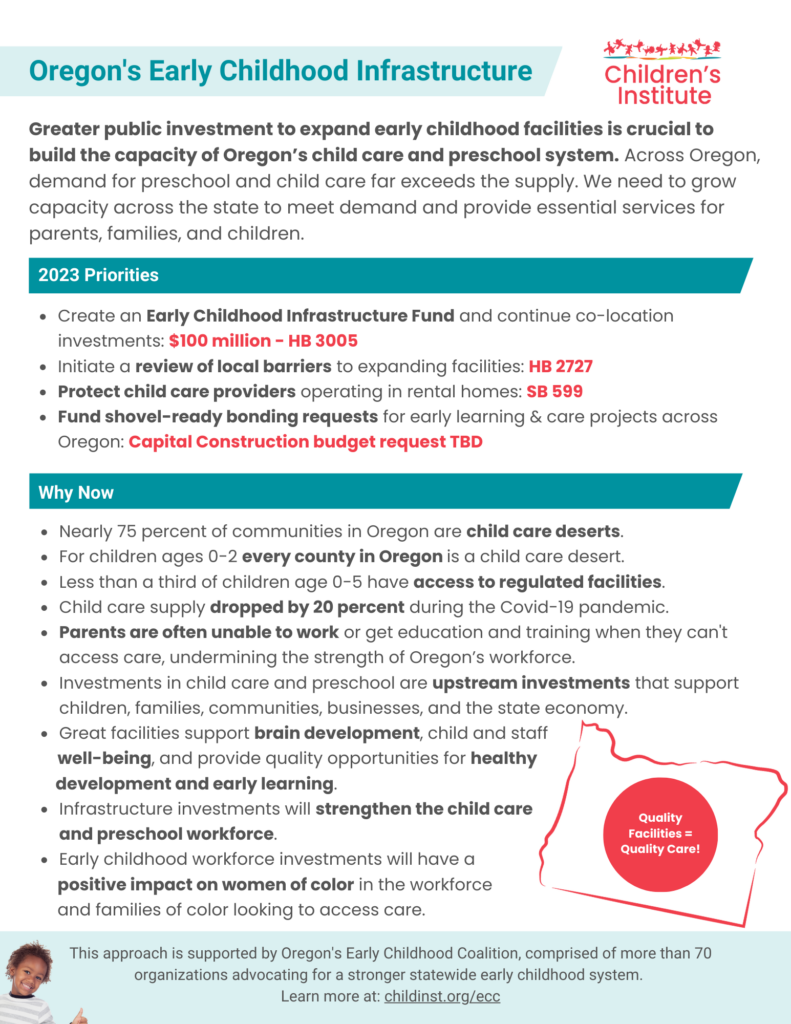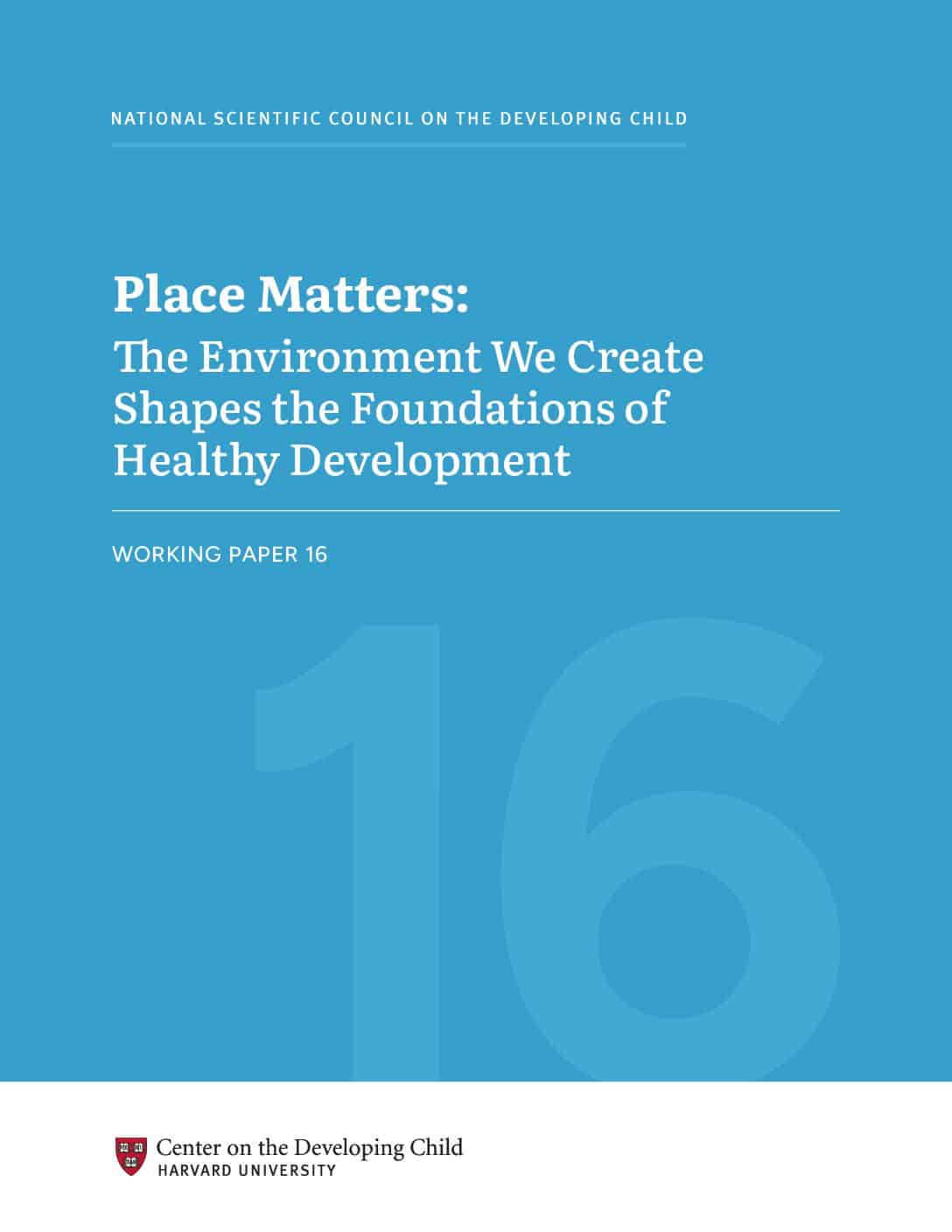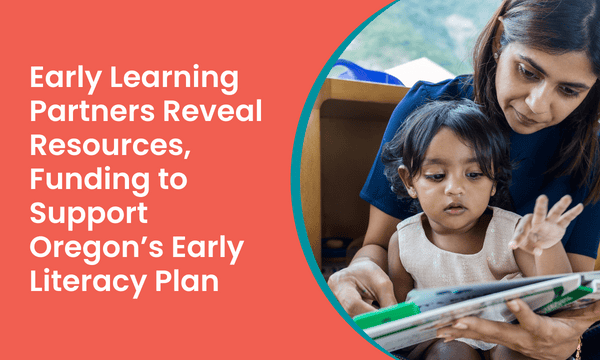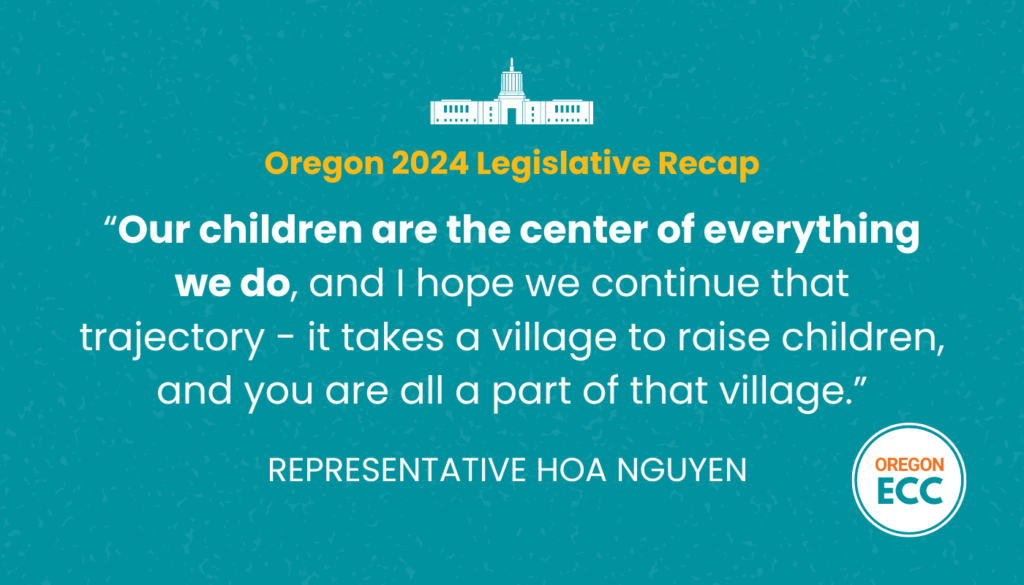Reimagining Spaces Where Children Grow and Learn
It’s time to rethink and redesign the places where young children, grow, play, learn, and explore their world. The passage of HB 3005 in June 2023 created the Child Care Infrastructure Fund, a new, $50 million investment designed to expand child care and preschool facilities across Oregon. This is a key moment for Oregon: a great child care and preschool system needs high-quality facilities for children, families, and early educators. This investment sets the state on the right path, and yet we have more to do. Today, nearly 75 percent of communities in Oregon are child care deserts. Demand for preschool and child care far exceeds the supply. And Oregon is still recovering from the loss of child care supply from the Covid-19 pandemic. As we work to strengthen and expand child care and preschool across the state, and create new, vibrant learning spaces for your youngest learners, we invite you to join us. Learn more below! Questions? Contact Dana Hepper, dana@childinst.org.
Reimagining Spaces Where Children Grow and Learn
It’s time to rethink and redesign the places where young children, grow, play, learn, and explore their world. The passage of HB 3005 in June 2023 created the Child Care Infrastructure Fund, a new, $50 million investment designed to expand child care and preschool facilities across Oregon. This is a key moment for Oregon: a great child care and preschool system needs high-quality facilities for children, families, and early educators. This investment sets the state on the right path, and yet we have more to do. Today, nearly 75 percent of communities in Oregon are child care deserts. Demand for preschool and child care far exceeds the supply. And Oregon is still recovering from the loss of child care supply from the Covid-19 pandemic. As we work to strengthen and expand child care and preschool across the state, and create new, vibrant learning spaces for your youngest learners, we invite you to join us. Learn more below! Questions? Contact Dana Hepper, dana@childinst.org.
Child Care = Equitable Infrastructure for Oregon’s Workforce
Child care serves as a community asset that benefits children and families and promotes the well-being of entire communities. The right supply of quality child care promotes economic development by:
- Enabling parents, especially mothers, to fully engage in the workforce
- Promoting employee productivity generally
- Improving the well-being of early childhood educators
- Preparing children for kindergarten and beyond, where they gain skills to become contributors to the state economy
- Interrupting cycles of poverty and inequity
Increasing support for early childhood education is the most effective and cost-efficient way of providing greater opportunities for people who have been disadvantaged by inequitable systems. We can increase equitable outcomes on a wide range of factors, i.e. high school graduation, incarceration, homelessness, health.
Sadie Feibel, deputy director of programs at Latino Network in Multnomah County points out that best practices include culturally specific programs with parent education and involvement, thus impacting whole families. “Educational institutions can be sources of racial trauma for our children or they can be sources of opportunity. We have to be very intentional in our expansion of the early childhood system to avoid perpetuating trauma, and supporting culturally competent programs is crucial for this.”
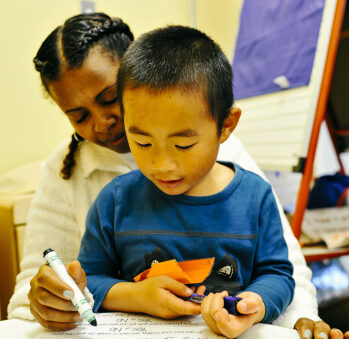

“The business community is stating clearly that they can’t recruit staff because people don’t have child care.”
We're working on it in Oregon.
See below for exciting 2023 policy updates right here in Oregon. 2024 funding landscape updates are included below.
Create a Child Care Infrastructure Fund (HB 3005): Passed / Partially Funded
$50 million in Lottery Bonds allocated to Business Oregon to fund projects, $5 million allocated to Department of Early Learning and Care to contract for technical assistance to support providers to access the fund. In addition, $11 million+ in shovel ready early childhood projects were funded.
Review Zoning, Building Code, & Permitting Impact on Child Care (HB 2727): Passed!
$225,000 has been allocated to the Department of Land Conservation & Development to identify challenges and best practices, and to make recommendations for improvement at the city, county, and state levels.
Protect Child Care Providers in Rental Homes (SB 599): Passed!
Landlords can no longer prevent licensed child care from operating in rental homes. They can require liability protection to be in place.
Expand Co-Location of Child Care & Affordable Housing (OHCS POP 114): Not Funded
This effort has $10 million currently, but did not receive the additional $20 million requested by Oregon Housing & Community Services.
Funding Wins from 2021 that made the above (and more) possible:
Oregon Housing and Community Services: Co-location of affordable housing and early childhood services
Housing Development: State of Oregon grant program for co-locating affordable housing with early childhood services
Get Involved! We need you!
What's Your Fit?

Interested in reimaging the places and spaces where children learn? Are you a real estate expert, an architect, building contractor, or a child care professional? Find the Venn diagram between your work, how you’d like to help, and what Oregon needs to flourish.
Let's Talk!

As much as we love a digital resource, sometimes just sitting down to talk about things can be the best way to learn more and get involved. Reach out at info@childinst.org to schedule a conversation. We’d love to hear from you.
Stay Informed
If you’ve been thinking, “I wish there were a way to keep up with key legislative and regulatory updates for early childhood infrastructure…”, we can make your dream come true. Join our email list for the latest updates in early care facilities for Oregon.
Facility Costs are a Primary Obstacle to System Expansion and Quality Improvement
“There is a huge need for additional child care places, but it’s extremely difficult to find appropriate spaces and initial remodeling costs are not affordable,” said Odi Campos, program director at the Oregon Child Development Coalition.
According to Patricia Alvarado, director of education programs at Adelante Mujeres in Forest Grove, “in order to furnish one preschool classroom with toys and materials that are age appropriate and according to safety measures you are talking about $24,000.”
There is a dearth of financing options for child care facilities, which is why public investment is necessary to stimulate growth.
Public Funding Models in Other States Have Proved Successful →
Massachusetts, Illinois, Connecticut, and California have all set up programs to invest specifically in construction, remodeling, and other site-specific supports.

Massachusetts Model

Illinois Model

San Francisco Model
We’re Inspired By…
Organizations like Mission Driven Finance are looking for innovative ways to finance education and early care providers in both place-based portfolios and dedicated early care investments. In this video produced by their team, three family child care providers—Elsa Romero, Samsam Khalif, and Maria De Lourdes Gandarilla—share their stories in partnership with the National Children’s Facilities Network. The short film highlights the importance of the Care Access Real Estate (CARE) Investment Trust, an initiative set up to ensure family child care providers have the tools to succeed, and to ensure American families have access to quality, affordable care for their children.
Tools & Resources
Read or listen at the links below to learn more about recent updates, policy initiatives, and statewide impact of Oregon’s early childhood infrastructure.
Tools & Resources
Read or listen at the links below to learn more about recent updates, policy initiatives, and statewide impact of Oregon’s early childhood infrastructure.
Facilities Roundtable Brainstorming
In May 2023, advocates for Infrastructure transformation from around the state gathered to collaborately ideate. From finance and real estate experts to construction specialists and educators, this diverse group of professionals talked through the vision, policy shifts and financing needed to bring Oregon infrastructure forward. The word cloud to the right shows consistent themes from the conversation and dreams for the future.

Latest on Infrastructure and Facilities Policy from Children’s Institute
Early Learning Partners Reveal Resources, Funding to Support Oregon’s Early Literacy Plan
This week, Children's Institute and state early learning partners hosted a webinar to elevate the importance of an intentional focus on early literacy strategies for early child care providers, educators, and families; and share funding updates.
Oregon Prepares to Fund Early Literacy Efforts
In 2023, Oregon lawmakers passed the early literacy success initiative in an effort to support reading proficiency in young children. Now, the state is poised to distribute those funds.
Short and Sweet: Oregon’s 2024 Legislative Session
As the Oregon 2024 Legislative Session ended this year, the Policy and Advocacy team at CI let out a deep breath of gratitude, relief, and excitement for the year ahead. Short sessions often prove frustrating for what can be accomplished, but this year built on the chaotic momentum of 2023’s session, clearing the path for early childhood advocates to make great strides forward.


